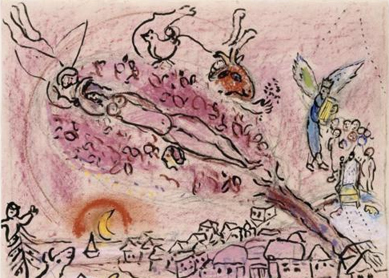
(Marc Chagall, Song of Songs II, via BibleOdyssey)
By way of a springtime offering, heading into the final two festival days of Passover, and into this coming Shabbat - herewith some latter day echoes of the Song of Songs, the biblical book traditionally chanted on this upcoming Sabbath.
It is not every text attributed to an Israelite monarch of some one thousand years before the Common Era that is still quoted and sung, verbatim and interpretively, in our own times by new world composers and by pop icons. (See the links to musical selections at the end of this post.)
The fact that the Song of Songs continues to inspire and to beget poignant and relevant songs, sacred and secular, may have less to do with the book's association with King Solomon and more to do with a different kind of authenticity - the truth of human experience that rings in its verses, through the ages.
Whether a woman - or women - were involved in the actual writing of the book's poetic text, it is unmistakable that somewhere in the background is a female psyche seeking to be understood by a male counterpart. 'If I respond to your romantic overtures,' the woman-voice in the Song of Songs says to her would-be lover, in effect, 'then I am liable to be assaulted by those who patrol the boundaries of our society.' (see Song 5:2-8) Or, if we say, with Freud, that all the characters in a dream are aspects or emanations of the dreamer, then we may perceive in the same passages the beating up of oneself that is still, in our own day, all too common an internal response to sexual and sensual awakening. On the other hand, today we live in a Western society blessed to so much greater a degree with matter-of-fact acceptance of sexual bodies and sensual selves that it may not occur to us just how radically and deeply affecting, even shocking it probably was for a woman raised in a culture of Levitical rites and rules to hear, about her own body, every part - without exception - "all of you is beautiful, my love, there is no flaw in you" - the verse using the selfsame term for 'blemish' that otherwise, ubiquitously in the Bible, denotes disqualifying physical irregularities; and banishing the thought. (Song 4:1-6)
From close to the book's own day until close to our own, its vivid and extremely physical poetry was preserved canonically because it was interpreted allegorically, as symbolizing love between Divinity and human community. The biblical prophet Isaiah deploys the poetic tropes of the Song of Songs in that metaphorical sense. (Isaiah 5:1-7) The prophet Ezekiel sings to a wayward Israel on God's behalf in terms that sound like nothing so much as the pop song "Don't You Want Me, Baby?" (Ezekiel, chapter 16, where recollection of our nation's Amorite and Hittite origins corresponds quite exactly in sense to "You were working as a waitress in a cocktail bar when I met you," sayeth the Lord - so to speak.)
Here is Sinead O'Connor, renegade and recovering Catholic schoolgirl and self-styled Catholic Priestess, singing her own interpretation of the Song of Songs,' (Song 1:5-6; 8:2; 8:7) unmistakably personal to her.
Here is a Boston composer of the Revolutionary Period, William Billings (1746-1800), who was born and died (in poverty) not far from Harvard - "a singular man, of moderate size, short of one leg, with one eye, without any address, and with an uncommon negligence of person, still, he spake and sung and thought as a man above the common abilities" - interpreting "I am the rose of Sharon and the lily of the valleys." (Song 2:1-8)
Here are the Parvarim - a Simon-and-Garfunkel-like duo of Israel's 1960s - singing a ballad that contains no whole lines quoted from the Song of Songs but whose poetic idiom in Hebrew is entirely unthinkable without the biblical book - their song representing a time when popular Israeli singers situated themselves in the ancient landscape of the renascent homeland by daring to cast themselves as direct inheritors and onward carriers of biblical poetry.
Here pop singer and record producer Kate Bush (knighted Commander of the Most Excellent Order of the British Empire) gets the Song of Songs right with the words, "Here's a woman singing," and with other apt words that some may consider a blasphemous interpretation.
And here, in the spirit of mystical and allegorical understanding, is the "Kabbalah Kirtan" of Yofiyah (Susan Deikman), chanting "I am my beloved's and my beloved is mine" (Song 6:3) in the manner of a raga - and in a way that, although culturally not directly contiguous, seems somehow plausible when thinking of how this poetry may have been sung and spiritually experienced in ancient times.
An eclectic potpourri - barely even skimming the great ocean of all that is out there echoing the Song of Songs...
And, on these notes - enjoy the springtime!
